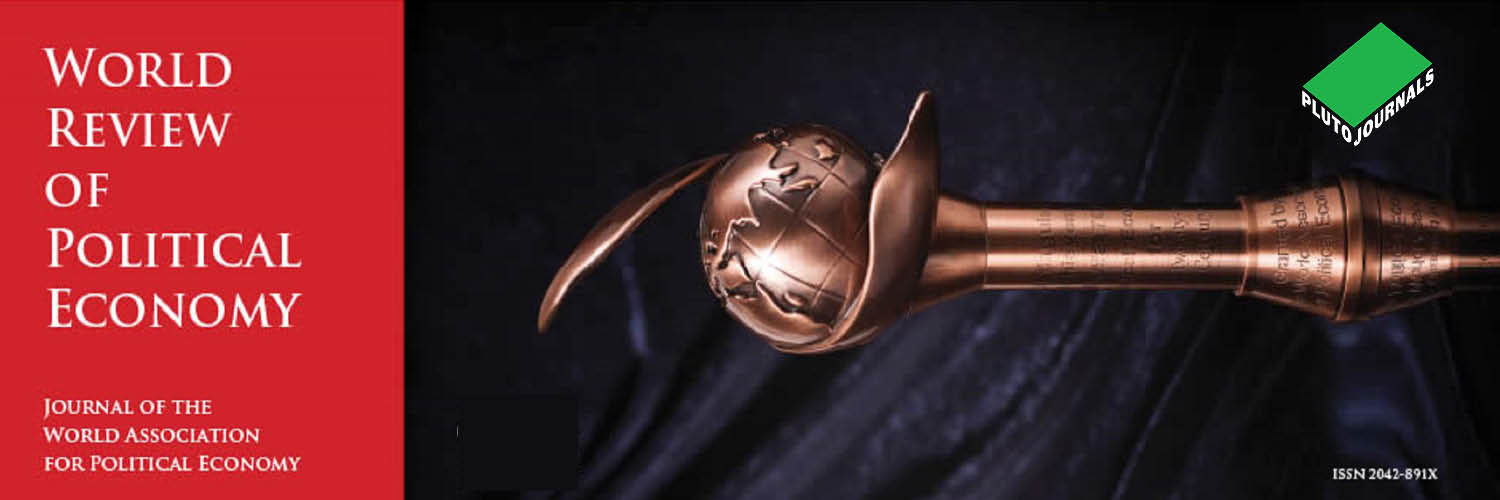
The World Review of Political Economy Volume 14 Number 4 The World Review of Political Economy Volume 14 Number 4.
The World Review of Political Economy Volume 14 Number 4.This edition comprises five articles addressing Political Economy and heterodox views.
Author Jeff Noonan’s article “Exploitation, Capitalist Crisis, and Democratic Planning: Problems of Piketty’s Socialism” carefully analyses the arguments of Thomas Piketty on the deleterious effects of income and wealth inequality which give Marxists an opportunity to intervene in this ongoing mainstream political-economic debate. As impressive as Piketty’s argument is a non-dogmatic Marxist examination of his texts reveals the lack of acknowledgement of the systematic driving forces of the capitalist economy and the undemocratic implications of widening inequality. Piketty lacks any explicit linking between the exploitation of labour, the falling rate of profit, capitalist crisis, the shift of investment from the productive economy to the financial sector, and growing inequality.
With framing of the 2008 great financial crisis and its inevitable re-evaluation of the cyclical development of capitalism, focussing on “temporal phases of capitalism”, this article “From Social Structures to Techno-Economic Paradigms: Comparison of Four Phases of Capitalism Theories” presents four “periodization of capitalism” theories: the social structure of accumulation theory, regulation theory, techno-economic paradigm approach and systemic cycles of accumulation school. Author Tamás T. Csontos concludes that every phase of capitalism has four elements: techno-economic paradigm, socio-institutional structures, demand regime and hegemonic state.
Author Hongren Xie’s article “The Opium Wars and Capital Accumulation: Comments on Karl Marx’s Perspectives on the Qing and England Recorded in The New York Herald Tribune” fleshes out Marx’s thinking with respect to imperialism and the relationship between wars and capital accumulation from amongst nearly 500 of Marx’s largely ignored, 1890’s editorials for The New York Herald Tribune. Marx notes the dominant Western powers of Great Britain and France advocating mercantilism, usually supported by military force, and wars to quickly accumulate national wealth. By the mid-nineteenth century Marx had clearly observed the link between the Opium Wars and capital accumulation particularly noted with Britain skilfully, legitimizing of the wars against Qing China using its official periodical, The Economist.
Author Matteo Capasso’s article “Theorising Sanctions as Warfare: Insights from the US-Led Aggression on Libya” departs from the conventional overfocus on efficacy of sanctions on countries accused of terrorist activities and instead draws on Fidel Castro’s concept of the “Battle of Ideas” and argues that sanctions should be studied as a form of US-led imperialist warfare over the Global South. Taking the case of Libya, with archival sources CIA, US, Libyan government and UN documents along with secondary literature this article argues that sanctions act as a form of economic warfare that supplants or complements the use of other forms of warfare, including military and non-military. and renews the question of financial subordination, dependency, war, and imperialism in the Arab world, and the Global South at large.
Author Ahmet Zaifer’s article “Turkish Experience with Divestiture between 2010 and 2019: A Comparative Historical Evaluation” employs a Marxian analytical framework to explain divestitures in Turkey in the 2010s and aims to fill the gap in scholarly literature on these most recent years within Turkey’s four decades of divestiture policies. Ahmet argues that the most recent era of divestiture is significantly different from previous ones in terms of its scope, economic and political implications and the capital groups benefiting from divestitures.
The World Review of Political Economy is Diamond Open Access. Read the latest issue Table of Contents and articles within the WRPE Collection on ScienceOpen.

